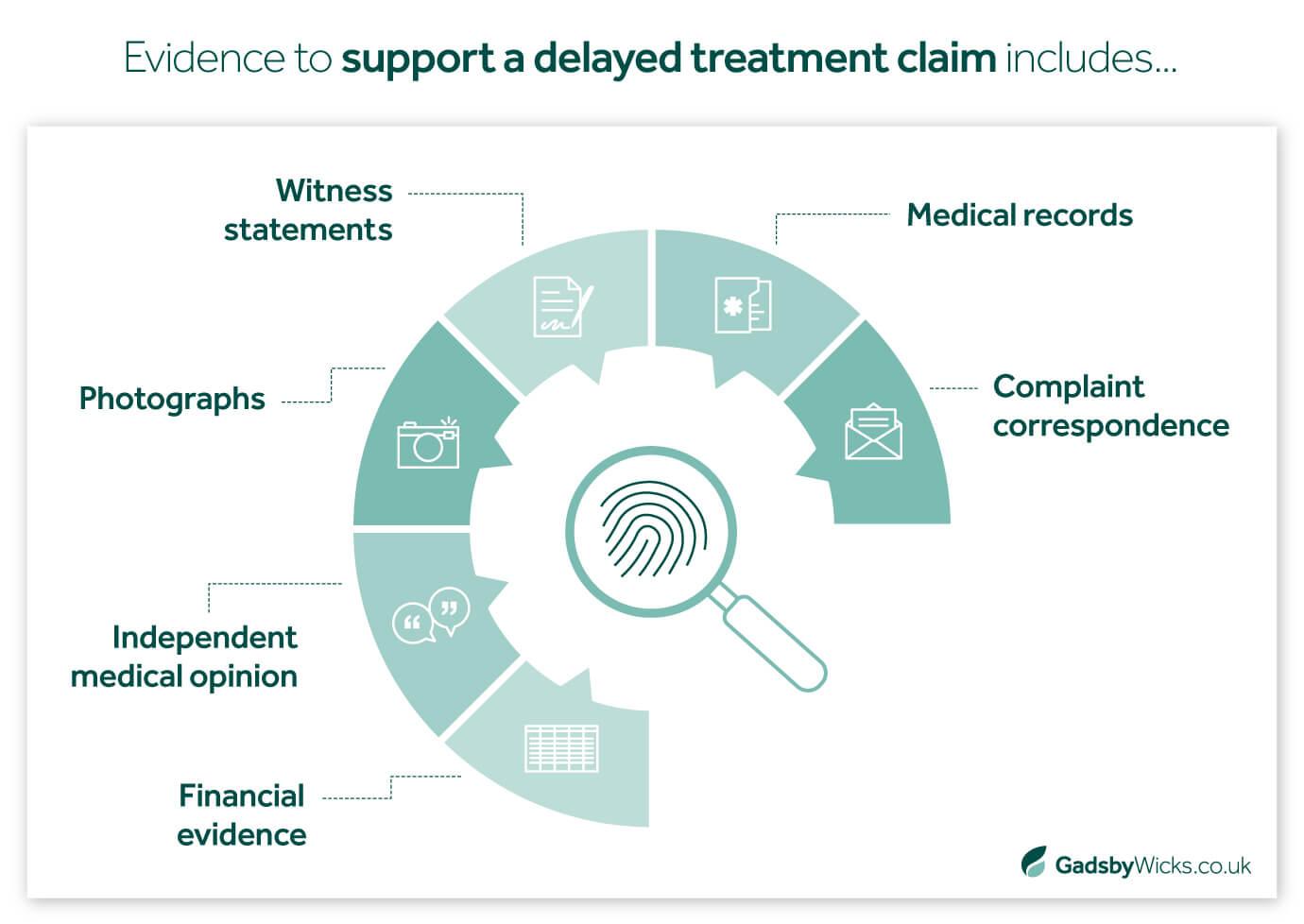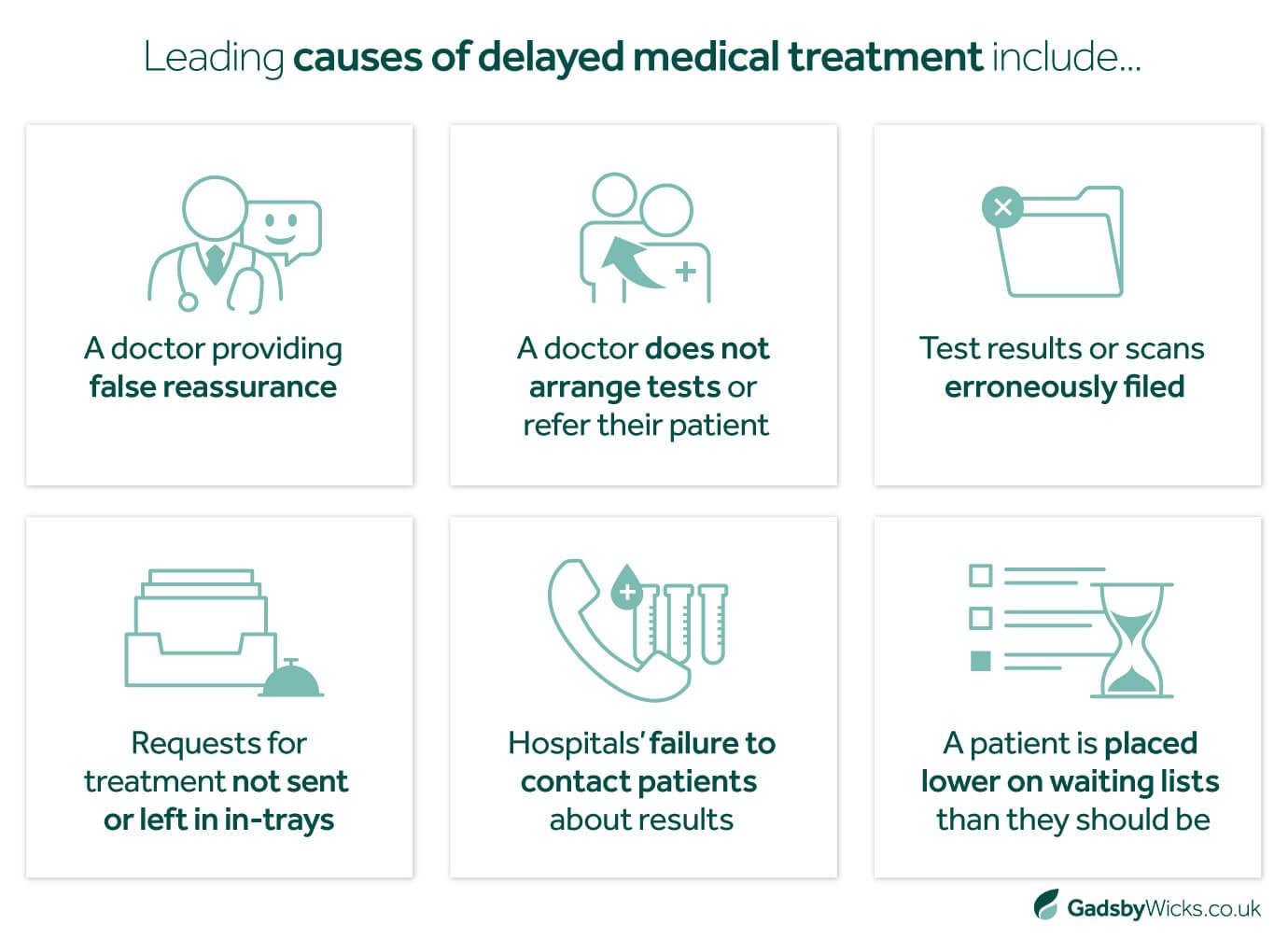- Home >
- Delayed Treatment Claims
When avoidable mistakes lead to significant delays in medical treatment, the implications can be vast – affecting everything from your immediate physical and emotional welfare, to your long-term quality of life.
If you suspect negligence was to blame for your delay in treatment and poor outcome, we can investigate what happened, uncover answers and secure your financial future. With millions in compensation recovered for our clients since 1993, trust us to build your case and reach the best possible resolution.

Do you have a delayed treatment claim?
Not all clinical delays are considered negligent. But if you suspect unjustifiable mistakes caused your treatment to be interrupted – and this caused you to suffer physically, emotionally or financially – you may be entitled to make a delayed treatment claim.
Whether your delay was due to misplaced test results, poor scheduling or false reassurance from your doctors. Our trusted team of delayed treatment solicitors can help you navigate the complexities of litigation, present the strongest case possible, and secure the damages you need to support you and your family’s future.

The specialist delayed treatment claims solicitors for Essex & East Anglia
Since 1993, we have been the solicitors that claimants trust to establish whether the delays to their treatment were due to negligence.
Our specialist solicitors get to the bottom of what happened and establish causation, assessing all available evidence. With unrivalled attention to detail, 96% of our cases are resolved out of court, and through our ‘no win, no fee’ approach, we ensure you have total security and peace of mind at every step of your journey.
How much could your delayed treatment claim be worth?
What does our delayed treatment claims process look like?

A free initial consultation
Call us, request a callback or complete our online form and we’ll assess if you have a valid medical negligence claim.

Funding your claim
Discover the ways we can fund your claim without you paying a penny at any stage of the process.

Investigating evidence
We gather medical records, witness statements and more to learn what happened to you and prove your claim.

Instructing independent medical experts
We work with impartial, experienced medical experts to establish whether your injuries were due to substandard medical care.

Valuing your claim
We assess your health and financial losses to accurately estimate how much compensation your claim is worth.

Presenting your case
We contact the Defendants and the Courts on your behalf to set out your allegations and receive a response.

Negotiating a settlement
We work to achieve a fair settlement for you outside the courtroom – this is how 96% of our cases end.

Preparing for Trial
If we must proceed to Trial, we fully prepare you for what to expect so you receive the right result in court.
What you need to know about delayed treatment claims
What is the definition of delayed treatment?
Many circumstances can result in someone waiting longer for medical treatment, from hospital waiting times to healthcare professionals failing to identify a patient’s symptoms.
However, for delayed treatment to be considered negligent:
- The delay must be due to a healthcare professional breaching their duty of care
- The delay must be significant
- The delay must have directly caused the claimant’s injuries
If delayed treatment is due to mistakes by a healthcare professional – mistakes that no reasonable professional in their position would have made – then this would be considered a breach of their duty of care.
A significant delay leads to a change in a patient’s condition, prognosis or treatment options. If no harm comes to the patient between the time their treatment should have started and when it actually started, then the delay is not considered significant.
For example, if a doctor fails to diagnose a patient’s breast cancer, but the patient then has this identified by another doctor two weeks later, it is unlikely that the patient’s disease would have progressed enough to alter their prognosis or treatment. This means a delayed diagnosis or a delayed treatment claim would be unsuccessful.
Conversely, suppose the patient’s condition is not diagnosed until a year later. In that case, this treatment delay may have significantly changed what treatment was available to them, and their long-term prognosis. This would make the delay significant, and the patient may be entitled to compensation.
When is medical negligence to blame for delayed treatment?
As mentioned above, to have a strong case for a delayed treatment compensation claim, medical negligence solicitors must prove that a healthcare professional breached their duty of care towards a claimant, and that the claimant’s condition, prognosis or treatment options changed.
There are circumstances where delayed treatment is justifiable, even if a patient’s condition worsens. One of the most notable relates to differential diagnoses, where there are multiple different causes for a patient’s ill health.
Imagine that following diagnosis, a patient is deemed to have one of three conditions:
- A fast-moving, potentially fatal disease
- A progressive condition
- A benign condition that does not require treatment
A healthcare professional will prioritise the first option, as it presents the most immediate risk. Should further tests rule this out, they would proceed to the next possible condition.
In this scenario, if the patient did have the second condition, it may have progressed while the testing was conducted for the first condition. However, if a healthcare professional has a solid rationale for delaying this medical treatment, there are no grounds for a delayed treatment claim.
Contrarily, if a healthcare professional started with the second condition, when in fact the patient was suffering from the first condition, this could be considered negligent as they did not prioritise their diagnoses correctly.
Where do I start with a delayed treatment claim?
If you believe you or a loved one has been affected by delayed treatment, speaking to experienced delayed treatment claims solicitors, such as our team at Gadsby Wicks, will ensure you receive the guidance you need to secure the justice and compensation you deserve.
We are regarded as one of the best medical negligence firms in the UK and will always be transparent about the claims process, where you are assigned one dedicated lawyer to manage your case from start to finish. They will thoroughly investigate all available evidence to support your claim, including:
- Witness statements
- Medical records
- Complaint correspondence
- Financial evidence
- Independent medical opinion
- Photographs
We will contact relevant, impartial medical professionals to determine whether the delay to your medical treatment was unreasonable and negligent, and the impact this delay had on your treatment options and prognosis.

Our investigation may conclude that a delay was justifiable, or did not affect the treatment you received or your long-term prognosis. We are always honest with our clients, even if that means informing them that we believe they do not have a viable claim.
However, if our experts confirm that a healthcare professional breached their duty of care to you and this changed your treatment options and/or prognosis, we work hard to ensure you are fully compensated.
We have multiple ways to fund your claim. Our clients often use a ‘no win, no fee‘ agreement, which guarantees you will not pay anything if your claim is unsuccessful. Our payment is recovered from the compensation you receive.
How long do delayed treatment claims take to settle?
We advise that you should expect a delayed treatment claim to take anywhere between two and five years to reach a final settlement. This will vary depending on the stance taken by the Defendants, and how long it takes medical experts to determine an accurate prognosis.
How long do I have to make a claim?
Like all medical negligence claims, a claimant has a three-year time limit from when an injury is realised to make a delayed treatment claim. There are exceptions to this rule – claimants under the age of 18 have until their 21st birthday to make a claim, while there is no time limit for those who are mentally incapacitated.
However, this does not necessarily mean three years after the negligent act occurred. It may be several months or years before a person recognises something is wrong with them.
In these circumstances, the date of knowledge ensures that someone can still make a claim. Here, the three-year time limit begins when a claimant should have reasonably suspected that something was wrong, rather than when the act of negligence happened.
Furthermore, every medical negligence claim is at the discretion of the court, meaning it is possible for a claim to proceed even if the time limit has expired. Get in touch with our medical negligence experts for a free initial consultation and we will advise you on whether or not you have a viable claim.
How can delayed treatment compensation help me?
The compensation a claimant receives from a successful delayed treatment claim largely depends on how the delay impacted their prognosis and treatment options, and the long-term consequences of this.
The implications of delayed treatment can be vast, from simply the loss of earnings from a few additional days in hospital, to dramatically altering someone’s lifestyle, capabilities and life expectancy.
As an example, consider a doctor failing to diagnose a patient with Stage 1 breast cancer, reassuring them that nothing is wrong. Several years later the patient visits another doctor who discovers the cancer, but it has now progressed to Stage 4. This may mean:
- A condition that may have been resolved through a single surgery now requires more extensive surgery, radiotherapy and chemotherapy
- Their one-year survival rate may have dropped from 100% to 63%
The purpose of compensation is to help someone get back to the position they were in before the negligence or, if this is not possible, support changes to their life moving forward.
The possibilities of how compensation can help someone following delayed treatment are vast, and may include:
- The cost of necessary treatments
- Loss of earnings incurred while undergoing and recovering from treatment
- Claims for future losses due to being unable to work, or needing to change their employment
- Any necessary equipment or aids
- Therapies or support for any psychological harm caused by the experience
- Paying others for services that the claimant cannot perform anymore (e.g. gardening, household chores, etc.)
- Any adaptations required to the home or vehicles
For examples of how we have helped our clients secure the compensation they need to move on from delayed treatment, please explore our case studies:
Contact our expert delayed treatment claims solicitors
If you or a loved one believe you have been affected by a negligent delay in treatment, and would like to speak to someone about your options, our team is here to listen and advise you on your next steps.

Lexcel accredited medical negligence claims solicitors
We are proud to be a Lexcel-accredited practice. The accreditation is a mark of quality and comes directly from the Law Society.
A recent assessment described us as a “Centre of Excellence” and we continue to operate to the highest standards across all main areas of our field. These include client care, case management, financial management, structure and strategy, people management, risk management, information management and file management.




Industry Recognised








